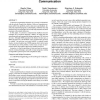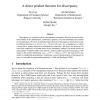163 search results - page 4 / 33 » Composition Theorems in Communication Complexity |
104
Voted
STOC
2006
ACM
16 years 26 days ago
2006
ACM
We consider the problem of bounded-error quantum state identification: given either state 0 or state 1, we are required to output `0', `1' or `?' ("don't ...
COCO
2007
Springer
15 years 6 months ago
2007
Springer
We examine the communication required for generating random variables remotely. One party Alice will be given a distribution D, and she has to send a message to Bob, who is then r...
103
click to vote
EMSOFT
2009
Springer
15 years 7 months ago
2009
Springer
Concurrent programming languages are growing in importance with the advent of multi-core systems. However, concurrent programs suffer from problems, such as data races and deadloc...
106
Voted
AICT
2006
IEEE
15 years 6 months ago
2006
IEEE
The Web services technology allows for easy creation of complex applications consisting of smaller components - Web services. This article performs an in-depth analysis of a Web s...
124
click to vote
COCO
2008
Springer
15 years 2 months ago
2008
Springer
Discrepancy is a versatile bound in communication complexity which can be used to show lower bounds in the distributional, randomized, quantum, and even unbounded error models of ...


